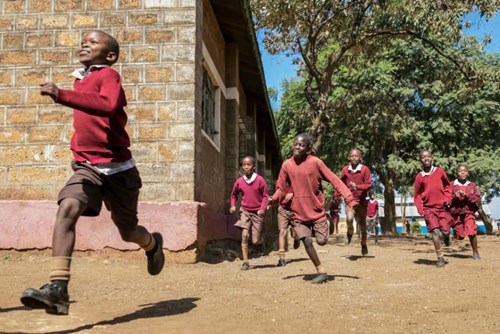Returning to school in Uganda
Published Date: 15 Feb 2022
Last month schools reopened in Uganda, for the first time for many since the start of the pandemic two year ago. This has had a devastating impact on all children.
Deaf Child Worldwide has been working in Uganda since 2015, through our partner NAPADEC (which stands for National Association of Parents of Deaf Children). The NAPADEC team recently shared with us a report it collated of what the return to school has been like for deaf children.
We have listed the key findings below.
Use of Ugandan Sign language has regressed
Nine out of ten deaf children are born to hearing families, which means that most deaf children are raised around spoken language which is inaccessible to them. In Uganda, deaf children usually learn sign language at residential deaf schools, and their families are unlikely to be proficient in it. This means that after losing two years of exposure to USL, deaf students are struggling to remember USL. One parent said:
"Deaf children have forgotten everything they learnt two years back. It has not been easy but I have tried to take my child back to school, she is very happy and excited to be at school.’’
Additionally, the resources that were distributed were not deaf-friendly, for example putting lessons on the radio, or on television without subtitles or interpreters.
Pupils’ behaviour and wellbeing has been badly impacted
Worryingly, NAPADEC says there have been many reports on the impact school closures have had on deaf children’s emotional health. Behaviour has been described as ‘quarrelsome’ ‘stubborn’ and ‘aggressive’. This makes sense considering we know that most deaf children have been with hearing families that they cannot communicate with properly and have been unable to express themselves.
Some deaf children have also become withdrawn and isolated, showing no interest in studying again. However, there are also reports of deaf children who are delighted to return to school.
Family finances are struggling to afford the return to school
Parents are facing significant costs in the return to school, which means for some deaf children that they cannot attend at all. School fees are beyond the reach of many families and then there are costs such as uniforms children have outgrown and the need for items such as books and pens again, all of which cost money.
NAPADEC’s report says:
"The deaf children in boarding school have reported without basic needs, if we send them back home, they will feel sad, and this has made it difficult for the teachers and administration in terms of meals and deaf girls with no sanitary pads.’’
NAPADEC has also found that older students, those over 16, are not returning to school because they have entered the workforce. It is unlikely those students will ever return to formal education.
Focus on the future
NAPADEC is working hard to support deaf students and their families in their return to school. Given the lack of access to Ugandan Sign Language over the past two years, its focus is on intensively rebuilding these skills.
This means it is:
- Continuing with sign language classes for parents who are still in the basic level since their consistency was affected by COVID 19 restrictions and curfew.
- Encourage involvement of siblings and friends to attend sign language classes.
- Encourage and include teachers who are keen on learning Sign Language.
